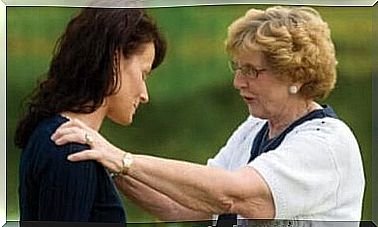Parents Who Control Their Adult Children

Receive hunches that aren’t necessary. Be the object of constant censure. Recommend what to do and what not to do. Using blackmail, manipulative language that steals motivation and even self-esteem… The way in which parents control their adult children is usually so sibylline that it would be enough to write a book.
However, this book would, in reality, be a diary of silenced sorrows and laments. Because reaching adulthood and having on your back the elongated shadow of the father who supervises and criticizes or the mother who uses a thousand tricks to remain in control diminishes dignity and makes all these dynamics invisible in our society.
A society that continues to exalt the work of parents and that sees in the family that refuge of unconditional love that involves and enriches everything. However, sometimes, the parents and their upbringing and education styles act as unhappiness factories. A suffering that is inoculated in childhood and, in many cases, persists into adulthood.
Why are there fathers and mothers who control their children? Why are these children, in most cases, unable to escape this influence? Let’s analyze the matter.

Parents who control their adult children
Many parents control their adult children from near and far. It doesn’t matter that this son or daughter has already left the family home and has a family of their own and a life apart. The umbilical cord remains unbroken and, through it, that poisoned love continues to feed in search of a single objective: to make the children continue to need their parents.
If we ask ourselves what is behind the need for control in these types of dynamics, the answer is simple. Those who seek control try to alleviate the feeling of lack.
In this case, what parents seek is to defend themselves from loneliness by convincing their children that they are still essential to them. Proximity (and dominance) gives them the feeling of remaining useful, of holding power, and thus alleviating low self-esteem and that distorted personality that doesn’t see the pain their behavior generates.
The fact that children are already adults doesn’t stop this need to control one bit. The techniques must be more sophisticated, but those who have been a psychological manipulator for half their life or their whole life always find paths and strategies. It doesn’t matter if the child is still at home or has already left. Control networks continue to spread and suffocate very skillfully.
Parents’ Fear of Letting Life Flow Naturally
Those who control, as we already know, do it motivated by the feeling of need, but also by fear. They fear that a child’s life will go its way with independence, maturity and freedom away from home. Any attempt by the latter to take control of his own existence is interpreted as an offense, and emotions as strong as anger, anger and anguish instantly arise…
Seeing how the children dare, at any time, to make their decisions regarding work and personal issues is interpreted as a threat. Furthermore, the controlling father or mother will make the child see that, by taking this step, what he will achieve is nothing more than hurting them, because… “How dare you go to work in another city and leave me alone? ”, “How does it cross your mind to find a boyfriend or girlfriend now that I need you?”.
How do parents who control their adult children do this?
Parents who control their children do so in covert, indirect, and painful ways. It’s such an insidious kind of manipulation that children don’t quite know how to explain the situation when they seek help through psychological therapy.
That spider’s web that imprisons and restricts freedoms, in fact, has always been around them, encapsulating them in such a way that sometimes children take something that is not normal at all as normal.
- The controlling parent is always there to “help,” but thanks to this seemingly well-intentioned help, they have an excuse to dominate. Thus, the fact that they help financially, that they carry out certain tasks, ultimately serves not only to control the children, but also to blackmail and continue exercising authority.
- On the other hand, they also make use of that emotional manipulation that spills over the son or daughter the constant feeling of guilt, of abandoning, betraying or hurting the parent.
- Control is also exercised with the word, with those advice that seem like orders and that do not hesitate to tell us that it is “for our good, because they know what is best for us”.

How to get out of the controlling parents’ prison?
Reflecting on the relationship we have with our parents is a must. We must do this to understand (regardless of our age) whether this bond offers us well-being or suffering. We mention the latter because some people do not understand to what extent the shadow of the media family distorts their quality of life.
- We must make clear with our parents what behaviors we are willing to accept or not.
- Setting clear boundaries is a health exercise. If they don’t respect them, react badly and use victimization, warning us that we are abandoning them, we must avoid falling back into their nets. When we draw a line, parents have only two options: accept them or see how we go even further.
The right thing to do in all cases is to speak assertively and clearly to our parents about how we want things to be for everyone’s good. In addition, and not least, we must not neglect another essential aspect: healing all those years of constant wear and tear.
These wounds often leave the mark of low self-esteem and even post-traumatic stress disorder. Let’s keep that in mind.









